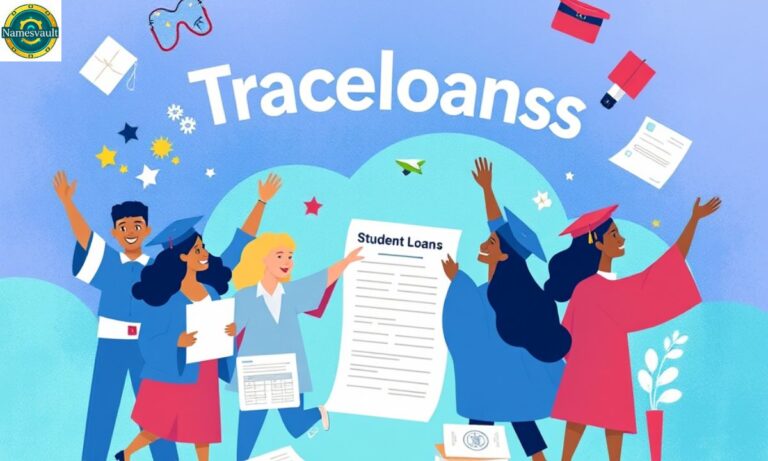Navigating student loans can be overwhelming, especially for non-traditional students. Many face unique challenges like balancing work, family, and school. Traceloans.com provides flexible financing solutions that cater specifically to these needs.
With personalized loan guidance and a variety of options, it’s easier to manage tuition costs. Whether you’re a career changer, a part-time student, or someone with dependents, Traceloans.com has your back.
Understanding Non-Traditional Students
Non-traditional students are those who don’t follow the typical straight path to higher education. They may be older than traditional college students or have had a gap in their academic journey. Many are juggling family, work, or other responsibilities while pursuing their education.
These students face different challenges than traditional students. They need flexible financing solutions, personalized loan options, and support systems tailored to their unique life situations.
How Traceloans.com Caters to Non-Traditional Needs
Traceloans.com understands the challenges non-traditional students face. The platform offers customized loan guidance based on individual financial situations. This means students receive the most suitable loan options that fit their lifestyle and career goals.
Traceloans.com’s flexible solutions address both repayment challenges and long-term financial needs, making it easier for non-traditional students to succeed in their educational and professional journeys. The platform helps students navigate the complexities of financial aid, offering guidance and support.
Exploring Income-Driven Repayment Plans
Income-driven repayment plans are a valuable option for non-traditional students. These plans adjust monthly payments based on income and family size. This makes it easier for students to manage their debt while dealing with other financial obligations.
By selecting income-driven plans, students can lower their monthly payments and extend the repayment period if necessary. This option is especially useful for non-traditional students with fluctuating incomes or those working part-time jobs while studying.
Types of Income-Driven Plans: PAYE, IBR, and Others
Several types of income-driven repayment plans are available to students. The Pay As You Earn (PAYE) plan, Income-Based Repayment (IBR), and others offer different structures for repayment.
Each plan has unique features and eligibility requirements. For example, PAYE allows for lower monthly payments based on income, while IBR offers more flexibility in adjusting payments. These options make managing loan repayment easier for non-traditional students with varying financial circumstances.
Leveraging Employer Tuition Assistance Programs
Many employers offer tuition assistance to help their employees pay for education. Non-traditional students can take advantage of these programs to reduce the cost of their education. This support can significantly reduce their reliance on student loans.
To use employer tuition assistance, students should check with their HR department to learn about the eligibility and application process. These programs can be an excellent way to manage education costs without accumulating excessive debt.
Utilizing Work-Study Opportunities for Financial Support
Work-study programs offer students the opportunity to earn money while studying. These jobs can help non-traditional students manage their finances and gain work experience at the same time. Eligibility for work-study typically depends on the student’s financial need.
Non-traditional students can balance their academic responsibilities with work-study opportunities, providing a steady income while continuing their education. It’s a practical solution for those who need additional financial support.
Benefits Beyond Income
Work-study offers more than just financial relief. It allows students to gain valuable work experience and improve their professional skills. Students can build their resumes and network with potential employers, which can be helpful in the long term.
By participating in work-study, non-traditional students gain experience in their chosen fields. This can enhance their job prospects after graduation and contribute to career growth.
Considering Income Share Agreements as an Alternative
Income Share Agreements (ISAs) are becoming an alternative to traditional student loans. With ISAs, students agree to pay a percentage of their income after graduation instead of a fixed loan amount. This flexible repayment structure works well for non-traditional students.
The key advantage of ISAs is that students only pay based on what they earn. If their income is low, their payments are lower, making it an adaptable solution for students with uncertain future incomes.
What are ISAs?
Income Share Agreements are contracts where students agree to pay a portion of their future income in exchange for funding their education. The payment percentage is agreed upon before the student enrolls in school, and payments begin after graduation when the student starts earning a steady income.
ISAs can be more flexible than traditional loans because they adjust payments based on the student’s earnings after graduation. This makes them a suitable option for non-traditional students with varying financial situations.
Pros and Cons of Income Share Agreements (ISAs) vs Traditional Loans
| Feature | Income Share Agreements (ISAs) | Traditional Loans |
| Repayment Structure | Flexible, based on income after graduation | Fixed monthly payments regardless of income |
| Risk | Lower financial risk if income is low | Higher financial risk if income is not sufficient |
| Payment Amount | Payments fluctuate based on earnings | Fixed payments that may be higher than income-driven options |
| Eligibility | Based on potential future earnings, not credit score | Based on credit history and financial situation |
| Loan Forgiveness | Possible forgiveness after a certain period or amount | Rare or difficult to achieve, usually tied to specific conditions |
| Financial Burden | Less burden in low-income years, payments adjust to earnings | Higher immediate financial burden, can be difficult to manage in tough times |
| Flexibility | Highly flexible, adjusts to individual earning capacity | Less flexible, payments must be made as agreed |
| Credit Impact | Does not affect credit score directly unless payments are missed | Can impact credit score significantly if payments are missed |
| Upfront Cost | No upfront cost, payment is based on future earnings | Requires full repayment amount upfront |
| Transparency | Terms can be complex and vary based on the provider | Terms are more standardized but can be complex depending on the loan type |
Exploring Scholarships and Grants for Non-Traditional Students
Scholarships and grants are excellent ways for non-traditional students to fund their education without taking on debt. These awards don’t need to be repaid, making them a great financial resource. Non-traditional students should actively seek out scholarships and grants specifically designed for their demographic.
Many organizations, schools, and government programs offer scholarships and grants to adult learners, working professionals, and parents. Researching available options and applying early can make a big difference in reducing educational costs.

Available Scholarships: Types and Eligibility Requirements
There are many different types of scholarships for non-traditional students. These can include merit-based scholarships, need-based scholarships, and those specifically for parents or working adults. Eligibility criteria vary depending on the scholarship provider.
Non-traditional students can find scholarships that align with their career goals, life circumstances, and academic achievements. By applying for multiple scholarships, they increase their chances of receiving financial assistance for their education.
Assessing the Impact of Recent Policy Changes on Student Loans
Recent policy changes have affected student loan systems, including repayment options and eligibility for federal aid. Non-traditional students must stay informed about these changes, as they could directly impact their financial aid and loan repayment plans.
The Trump administration and other policy makers have proposed changes to student loan forgiveness programs and repayment structures. These changes may provide more flexible options for non-traditional students.
Trump Administration’s Initiatives
Under the Trump administration, several proposals were made to alter the federal student loan system. Some of these proposals aimed at simplifying repayment options and potentially reducing the amount of debt students would need to pay off.
While these initiatives could provide non-traditional students with greater access to affordable repayment options, it’s important to follow updates and understand how the policy changes could affect individual loan situations.
Understanding the Role of Financial Aid Administrators
Financial aid administrators play a crucial role in helping non-traditional students navigate the often complex world of student loans, scholarships, and other financial resources. These professionals guide students in understanding their financial aid packages, loan terms, and eligibility for different programs.
Having a strong relationship with a financial aid administrator can help students get the most out of available resources and reduce confusion about the loan process.
Planning for the Future: Managing Loan Repayment Post-Graduation
Once non-traditional students graduate, managing loan repayment becomes a priority. It’s important to plan ahead to ensure that loan payments fit within the student’s budget and that the debt doesn’t become overwhelming.
Financial aid administrators often provide valuable advice on repayment strategies, including the best time to start payments and how to avoid default. With proper planning, non-traditional students can successfully manage their loan repayment and maintain financial stability.
Comparing ISAs and Traditional Loans
| Feature | Income Share Agreements (ISAs) | Traditional Loans |
| Repayment Structure | Pay a fixed percentage of income | Fixed monthly payments |
| Payment Flexibility | Payments adjust based on income | Payments do not change |
| Loan Forgiveness | Possible forgiveness after a certain time | Rare or none |
| Upfront Payment | No upfront payments required | Requires full repayment amount |
| Eligibility | Based on income potential, not credit score | Based on credit score and history |
FAQ’s
What is Traceloans.com?
Traceloans.com helps students, especially non-traditional ones, find and manage student loans.
How does Traceloans.com cater to non-traditional students?
It offers personalized loan advice and flexible repayment plans, tailored to individual needs.
Are there any income-driven repayment plans available?
Yes, Traceloans.com provides income-driven repayment plans to ease financial burdens.
Can I use employer tuition assistance with Traceloans.com?
Yes, Traceloans.com helps students integrate employer tuition assistance with loans.
Are there scholarships for non-traditional students?
Yes, Traceloans.com helps identify scholarships and grants specifically for non-traditional students.
Conclusion
Traceloans.com offers flexible solutions for non-traditional students, making education more accessible. With resources like income-driven plans, employer assistance, and scholarships, it’s easier to manage your finances while pursuing your education. Take control of your future today with Traceloans.com.

Hayat is a skilled content writer and SEO expert with 5 years of experience, specializing in digital marketing, SEO strategies, and content creation for various platforms.


![450+ Badass Panther Names [Fierce, Mystical & Unique Ideas] 450+ Badass Panther Names [Fierce, Mystical & Unique Ideas]](https://namesvault.info/wp-content/uploads/2025/02/450-Badass-Panther-Names-Fierce-Mystical-Unique-Ideas-150x150.jpg)
![600+ Cute & Catchy Pigeon Names [Perfect Ideas for Your Flocks] 600+ Cute & Catchy Pigeon Names [Perfect Ideas for Your Flocks]](https://namesvault.info/wp-content/uploads/2025/02/600-Cute-Catchy-Pigeon-Names-Perfect-Ideas-for-Your-Flocks-150x150.jpg)

